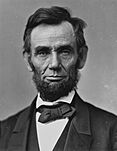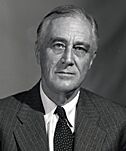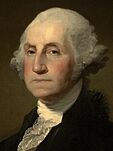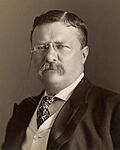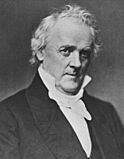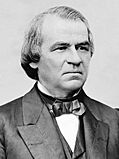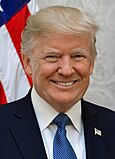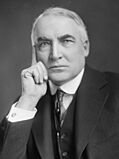Historical rankings of presidents of the United States facts for kids

Have you ever wondered who the "best" or "worst" presidents of the United States were? Since the mid-1900s, people have been trying to answer this question! Experts like historians and political scientists often survey each other to rank presidents. They look at things like what a president achieved, how well they led the country, and any mistakes they made.
Most of these expert rankings agree that Abraham Lincoln was the best president. He led the country during a very difficult time. On the other hand, James Buchanan, who was president just before Lincoln, is often ranked as the worst. When regular people are asked, they usually remember more recent or very famous presidents.
How Presidents Are Ranked
Experts look at many things when ranking presidents. They consider how well a president handled big problems, managed the economy, and worked with Congress. They also think about a president's character and how they pursued fairness for all people.
Presidents Through Time
Some groups of presidents are often ranked similarly:
- The First Presidents: The first five presidents—George Washington, John Adams, Thomas Jefferson, James Madison, and James Monroe—were all Founding Fathers. They are almost always ranked in the top 20. Washington is usually in the top three, and Jefferson in the top five.
- Mid-19th Century Challenges: The years leading up to the Civil War were tough. Presidents like John Tyler, Zachary Taylor, Millard Fillmore, Franklin Pierce, and James Buchanan often rank in the bottom ten.
- World War II and Beyond: The mid-20th century, including and after World War II, is seen as a strong period for presidents. Franklin D. Roosevelt is consistently in the top three. Harry S. Truman and Dwight D. Eisenhower are in the top ten. John F. Kennedy and Lyndon B. Johnson are in the top 20.
- Recent Presidents: In the late 20th and early 21st centuries, presidents like Ronald Reagan, George H. W. Bush, Bill Clinton, Barack Obama, and Joe Biden have all appeared in the top 20. Reagan and Obama are often in the top ten.
How Experts Rank Presidents
Many different groups have conducted surveys to rank presidents over the years. Here are some of the most well-known:
Siena College Surveys
The Siena College Research Institute started its surveys in 1982 and has continued them regularly, including in 2010, 2018, and 2022. These surveys ask historians and political scientists to rank presidents based on many qualities, like their leadership, accomplishments, and ability to handle problems.
The 2018 Siena poll found that George Washington, Franklin D. Roosevelt, Abraham Lincoln, Theodore Roosevelt, and Thomas Jefferson were the top five presidents. This group is often called the "Mount Rushmore plus FDR" because they are so consistently highly ranked. Donald Trump, Andrew Johnson, and James Buchanan were ranked as the bottom three.
The 2022 Siena poll, which included Joe Biden for the first time, still had Franklin Roosevelt first, Lincoln second, and Washington third. The bottom three remained Trump, Buchanan, and Johnson.
C-SPAN Surveys
The C-SPAN Survey of Presidential Leadership also regularly asks presidential historians and biographers to rank presidents. These surveys happened in 2000, 2009, 2017, and 2021. Historians rate each president on a scale of 1 to 10 in ten different areas, such as how well they persuaded the public, handled crises, or pursued equal justice.
The results of the C-SPAN surveys have been very similar over time. Abraham Lincoln has always been ranked first. George Washington, Franklin D. Roosevelt, and Theodore Roosevelt are always in the top five. On the other hand, James Buchanan, Andrew Johnson, and Franklin Pierce are consistently at the bottom of all four surveys.
Rankings by Political Views
In a 1982 survey by Murray–Blessing, historians were asked if they were liberal or conservative. Interestingly, both groups mostly agreed on the top and bottom presidents. For example, both liberals and conservatives ranked Abraham Lincoln first. They also largely agreed on who the worst presidents were.
Rankings on Diversity and Racism
Some experts have also ranked presidents based on their views and actions regarding race. Professors Hanes Walton Jr. and Robert Smith, in their book American Politics and the African American Quest for Universal Freedom, categorized presidents based on their beliefs and policies about race.
Another survey in 2019 by Alvin Tillery and Christina Greer asked researchers to rate modern presidents on their leadership and how they spoke about diversity and inclusion. In this survey, Franklin D. Roosevelt and Barack Obama received the highest overall scores.
How Well Presidents Are Remembered
It's also interesting to see which presidents people remember the most!
2014 Roediger and DeSoto Survey
In 2014, a study asked people to name as many presidents as they could. The most remembered presidents were recent ones like Barack Obama (100% of people remembered him), Bill Clinton (96%), and George W. Bush or George H. W. Bush (95%). Famous historical figures like George Washington (94%) and Abraham Lincoln (88%) were also very well-remembered. Presidents from the mid-1800s, like Millard Fillmore (8%) and Franklin Pierce (7%), were remembered the least.
2021 Putnam Survey
A 2021 survey looked at how well people remembered presidents by their name and face. Again, Bill Clinton (98%) and Barack Obama (98%) were the most remembered by name. The least remembered presidents by name were James Buchanan (18%) and Calvin Coolidge (21%).
See also
- Legacy of George Washington
- Historical reputation of Thomas Jefferson
- Historical reputation of Ulysses S. Grant
- Public image of Bill Clinton
- Public image of Barack Obama
- Public image of Donald Trump
 | Sharif Bey |
 | Hale Woodruff |
 | Richmond Barthé |
 | Purvis Young |


